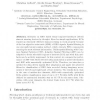Free Online Productivity Tools
i2Speak
i2Symbol
i2OCR
iTex2Img
iWeb2Print
iWeb2Shot
i2Type
iPdf2Split
iPdf2Merge
i2Bopomofo
i2Arabic
i2Style
i2Image
i2PDF
iLatex2Rtf
Sci2ools
126
click to vote
DAGM
2007
Springer
2007
Springer
Comparison of Adaptive Spatial Filters with Heuristic and Optimized Region of Interest for EEG Based Brain-Computer-Interfaces
Research on EEG based brain-computer-interfaces (BCIs) aims at steering devices by thought. Even for simple applications, BCIs require an extremely effective data processing to work properly because of the low signal-to-noise-ratio (SNR) of EEG signals. Spatial filtering is one successful preprocessing method, which extracts EEG components carrying the most relevant information. Unlike spatial filtering with Common Spatial Patterns (CSP), Adaptive Spatial Filtering (ASF) can be adapted to freely selectable regions of interest (ROI) and with this, artifacts can be actively suppressed. In this context, we compare the performance of ASF with ROIs selected using anatomical a-priori information and ASF with numerically optimized ROIs. Therefore, we introduce a method for data driven spatial filter adaptation and apply the achieved filters for classification of EEG data recorded during imaginary movements of the left and right hand of four subjects. The results show, that in the case o...
| Added | 07 Jun 2010 |
| Updated | 07 Jun 2010 |
| Type | Conference |
| Year | 2007 |
| Where | DAGM |
| Authors | Christian Liefhold, Moritz Grosse-Wentrup, Klaus Gramann, Martin Buss |
Comments (0)

